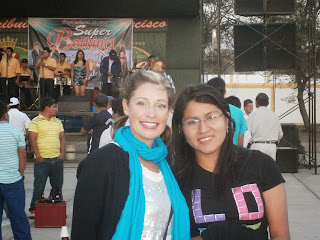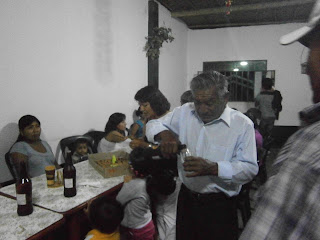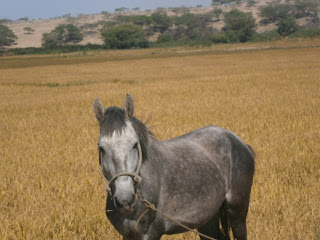When I accepted a two-year long volunteer position to
improve the health of a community in Peru, literacy was the farthest thing from
my mind. My focus was on measuring the
levels of malnutrition and preventable illnesses, like diarrheal diseases from
poor sanitation (“Montezuma’s Revenge” still exists in Peru!), and surveying
each household on their knowledge and behaviors regarding nutrition, early
childhood development and hygiene, and documenting their barriers to change.
But my focus expanded when the neighborhood kids started
coming to my house every afternoon to see what the “gringa” is doing. Often I am found sitting in front of my host
family’s home seeking shade and a cool breeze that allows me enough relief from
the mid-day heat to study Spanish textbooks, or just read for pleasure. The kids were curious about the books I was
reading, and I got into the habit of reading aloud from whatever book I had
with me.
Eventually I realized that these kids have rarely (or
possibly have never before) seen
anyone read for pleasure. The town’s
library is woefully lacking books and there are no textbooks books in the local
school. In addition, most parents have a
reading level that is too low to read to their kids; even if there was a way to
buy or borrow a book it could seem like an insurmountable challenge to read more
than a few pages.
I wanted to continue reading to the neighborhood kids,
but they got bored of hearing about my Spanish lessons and they were too young
for the fantasy adventure book I was reading. So, I asked my mother to send me
a few children’s books, including a Curious
Jorge book that told the story in both English and Spanish. The children
were absolutely fascinated with hearing the stories in both languages! They listened with rapt attention and tried
to figure out which English words corresponded to the Spanish words.
The children started coming over on a daily basis begging
me to read to them and asking to borrow the books to read to themselves. I was tickled to see their fascination with
the books and it spurred an idea to ask my friends and family to send more
books that could be donated to the library. I collected over 100 donations of books from the following contributors:
I scheduled regular weekly reading sessions in the community library, which received an overwhelming response. Each week 40 to 50 kids packed the tiny library to hear magical stories and finally have a chance to hold a book in their hands. I would like to thank the book donors for their generosity in helping me provide an opportunity to spark a love for reading for so many children.
Sandy and Nik Nichols
Bob Crow and Pat Snyder
Michelle Quivey
Julie Triplett
Allison Eichele
I scheduled regular weekly reading sessions in the community library, which received an overwhelming response. Each week 40 to 50 kids packed the tiny library to hear magical stories and finally have a chance to hold a book in their hands. I would like to thank the book donors for their generosity in helping me provide an opportunity to spark a love for reading for so many children.
Reading is a skill that is essential for developing a
child’s mind, which is essential for learning and critical thinking later in
life. Given their limited access to
books and internet, the children in my rural town finally have the opportunity
to stimulate their minds by exploring new and different worlds through stories
told in books. I have been so delighted
to find support from kind people who want to give these kids a chance to expand
their imaginations and lose themselves in reading, as we once did when we were
young. I am hopeful that this project
will truly have a lasting impact in the children of my adopted community which
will carry through to the next generation.
.JPG)
.JPG)
.JPG)



























.JPG)
.JPG)
.JPG)
.JPG)

.JPG)
.JPG)
.JPG)


.JPG)
.JPG)
.JPG)





